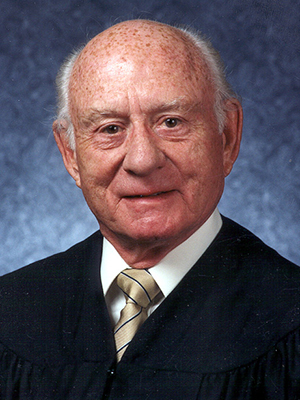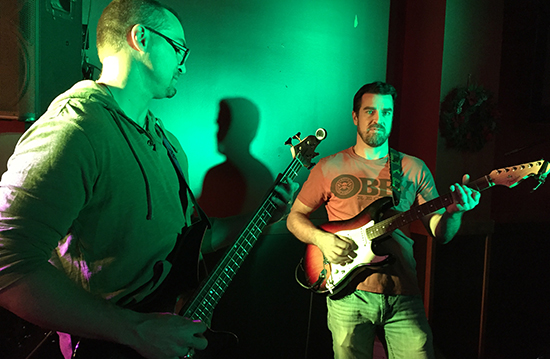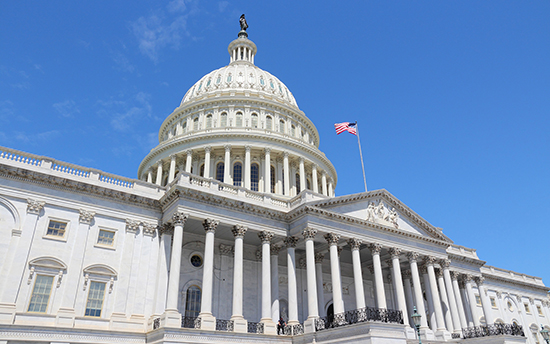Memoriam
Justice William G. Callow: Feisty and Intense

Former Wisconsin Supreme Court Justice William G. Callow passed away on March 6 at the age of 96. Justice Callow, U.W. 1948, served in both World War II and the Korean War before beginning his legal career in Wisconsin.
He started as a city attorney in Waukesha. In 1961, he was elected to the Waukesha County court and served two more terms before winning a seat on the Wisconsin Supreme Court in 1977. He retired in 1992 but continued to serve as a reserve judge and arbitrator/mediator for the Wisconsin Employment Relations Commission.
“He was a lawyer and judge whose passion for the law was driven by a superior intellect and strong conviction,” said Chief Justice Patience Roggensack in a statement released by the court.
“Generous and warm, he was known to be feisty and intense when a question of law needed answering. I knew a man of honor and commitment who never lost his sense of humor in the gravest of situations.”
Source: wicourts.gov
Good Idea
‘Mistrial’ Sounds Good

A “mistrial” is a trial a judge brings to an end, without a determination on the merits, due to a procedural error or serious misconduct occurring during the proceedings.
In Wisconsin’s Fox Cities area, “Mistrial” is also the name of a rock band with a lawyer and a judge on bass and guitar.
Band members Gregory Gill Jr. and Robert Bellin Jr. are gearing up for the summer music scene.
Gill, the bassist, is a judge for the Outagamie County Circuit Court. Bellin, guitarist, is a criminal defense and personal injury lawyer in Neenah. Together with three other band members, the five-piece band packs bars in the Fox Cities area.
Occasionally, people recognize them from somewhere else: their day jobs.
"I think it was one of the first times we ever played, I had a mom come up to me and say, 'You sentenced my son this week,'" Judge Gill told USA Today Wisconsin last month.
Tech Tip
Rest Easy: Free Artificial
Intelligence Research Tool
Checks Validity of Cases

Wondering how to quickly determine whether the cases in a brief
reflect the current law?
Ross Intelligence recently launched a new product, EVA, which
allows users to upload briefs or enter cases to determine whether
the cases have been subsequently criticized or received positive
treatment.
The free product just launched. Use it in combination with other
procedures to check the validity of cases and not as a substitute for
your current practices. The new tool can be accessed at https://eva. rossintelligence.com/#/login.
Source: Christopher Shattuck, State Bar Law Practice Assistance
Program Manager (Practice 411™)
On the Radar
Wisconsin-based Cases at the U.S. Supreme Court

At press time, the U.S. Supreme Court still had not decided two pending Wisconsin-based cases, including one that could be a landmark decision on political gerrymandering.
In Gill v. Whitford, argued in October, the court was asked to decide if voter districting maps that the Republican-controlled Wisconsin Legislature drew in 2011 amount to unconstitutional partisan gerrymandering. A special three-judge panel ruled (2-1) that they did. A decision may have huge implications for the 2018 election cycle, and not just in Wisconsin.
The other Wisconsin-based case is Epic Systems Corp. v. Lewis, in which the court was asked to decide if employers can require employees to sign agreements that waive class and collective proceedings in favor of individual arbitration. A panel for the U.S. Court of Appeals for the Seventh Circuit said such agreements violate the National Labor Relations Act.
Source: ScotusBlog
Did You Know
Self-driving Car Claims First Pedestrian Life

A self-driving car operated by Uber struck and killed a woman in Tempe, Ariz., in March. Numerous sources said it was the first case of a self-driving car killing a pedestrian.
A human safety-driver was at the wheel but the car was in self-driving mode. As a result, Uber suspended testing of autonomous cars in Tempe and three other cities. Volvo supplied the vehicle but Uber, which is also planning to transform the commercial freight business with self-driving tractor-trailers, made software and engineering changes.
“The incident could take on a life of its own in the courts, as well as the court of public opinion,” writes David Kiley for Forbes. “There is virtually no case law established around autonomous driving technology, which is controversial with wary consumers and regulators.”
Source: New York Times; Forbes
Quotable
“Behind closed doors, we call it testilying.”

– Pedro Serrano, a New York city police officer, talking about false testimony by police.
Last month, the New York Times published an article about the explosion of video evidence that conflicts with police testimony. "You take the truth and you stretch it out a little bit,” Serrano said.
The NYT’s investigation found that on more than 25 occasions, since 2015, “judges or prosecutors determined that a key aspect of a New York City police officer’s testimony was probably untrue.”
Video cameras are everywhere, the article notes. Police may be wearing a body cam, or an incident may be caught on tape by bystanders with cell phones or cameras affixed to buildings.
“Yet interviews with officers suggest the prevalence of cameras alone won’t end police lying,” wrote reporter Joseph Goldstein. “That’s because even with cameras present, some officers still figure – with good reason – that a lie is unlikely to be exposed. Because plea deals are a typical outcome, it’s rare for a case to develop to the point where the defendant can question an officer’s version of events at a hearing.”
Source: New York Times
